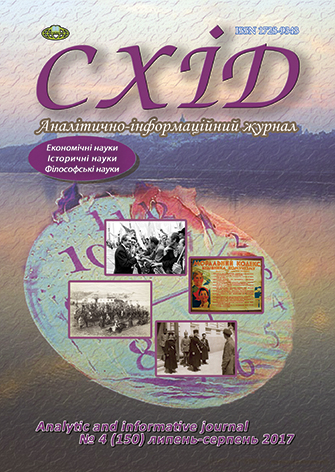Religious search in Russian philosophical thought at the turn of the 19th-20th centuries as a prerequisite to the formation of atheistic ideology
DOI:
https://doi.org/10.21847/1728-9343.2017.4(150).111560Keywords:
national idea, Slavophils, westerners, Marxism, scientific atheism, religiousness, Soviet identityAbstract
In his paper the author examines the place and role of religion-motivated purports and values in Russian thought at the turn of the 19th-20th centuries as a prerequisite to the formation of atheistic ideology of the Soviet Union.
It is the author's belief that the formation of atheistic ideology in the USSR has to be looked into in the context of the period that historically preceded the creation of the state in order to better understand the spiritual background of Russia when it entered into the Soviet stage of its history. After all, the people who were engaged in the revolution and started building the Soviet state matured in the second half of the 19th century.
The author examines the formation of the USSR, which process, partially artificial and partially natural, resulted in the development of a cultural tradition (the thinking in this case is underpinned by the research conducted by J. Assman, P. Berger, T. Luckmann and M. Eliade), which would meet the needs of different peoples, and understanding of what "the Russian culture and Russian man" should be like.
We suggest viewing that cultural tradition, implemented in Soviet practice, as a new articulation of "the Russian idea", which is one of theoretical views substantiated in this paper. A typical instrument for introduction of that cultural tradition was atheistic ideology, which formation prerequisites we discover in religious search of Russian intelligentsia at the turn of the 19th-20th centuries. However, it comprised "secularized" ideas of the chosen nation and its special mission, which formed the core of the Soviet ideological narrative.Downloads
References
Nivat, Georges (1999), Return to Europe. Articles on Russian literature. Russian religious man, available at: http://nivat.free.fr/archives/pdf/livre_retour.pdf
Roccucci, Adriano (2012), Reflections on post-secular society and on secularization in the history of Russia in modern times, available at: http://synergia-isa.ru/wp-content/uploads/2012/02/roccucci_rus.pdf
Popovych, Myroslav (2005), Red century, ArtEk Publisher, Kyiv, 888 p. (ukr).
Marshall T. Poe (1997), Moscow, the Third Rome: The Origins and Transformations of a «Pivotal Moment», available at: https://www.ucis.pitt.edu/nceeer/1997-811-25-Poe.pdf
Lotman, Yu.M. (1997), The Modernity between East and West, available at: http://www.philology.ru/literature2/lotman-97.htm
Berdyayev, Nikolay (2016), The origins and meaning of Russian communism. Azbuka, Moscow, available at: http://93.153.255.188/sites/default/files/files/pdf/berdiaev_.pdf
Dostoevsky, F.M. (1983), Complete Works in 30 volumes, Vol.25 Writer’s diary. Moskow, p.17. (rus).
Tolstoy, L.N. (1906), The Significance of the Russian Revolution, available at: http://tolstoy-lit.ru/tolstoy/publicistika/o-znachenii-russkoj-revolyucii.htm
Soloviev, V.S. (1909), The Russian idea [translat.], Voprosy filosofii i psikhologii. Vol. XX, kn. 100 (V). pp. 323-356, available at: https://cyberleninka.ru/article/v/russkaya-ideya-1
Toynbee, A. (2014), Russia’s Byzantine Heritage, available at: http://maxpark.com/community/politic/content/2843389
Downloads
Published
How to Cite
Issue
Section
License
Copyright (c) 2017 Volodymyr Hurzhy

This work is licensed under a Creative Commons Attribution-NonCommercial-NoDerivatives 4.0 International License.
1. Authors bear responsibility for the accuracy of facts, quotations, numbers and names used.
2. Manuscripts are not sent back.
3. The publisher does not always agree with the authors' opinion.
4. The authors reserve the right to authorship of the work and pass the first publication right of this work to the journal under the terms of a Creative Commons Attribution-NonCommercial-NoDerivatives 4.0 International License. This license allows others to distribute (copy) the published work for non-commercial purposes, provided there is mandatory attribution to its authors and a link to the first publication in our journal.
5. The authors have the right to conclude separate supplement agreements that relate to non-exclusive work distribution in the form in which it has been published by the journal (for example, to upload the work to the online storage of the journal or publish it as part of a monograph), provided that the reference to the first publication of the work in this journal is included.

